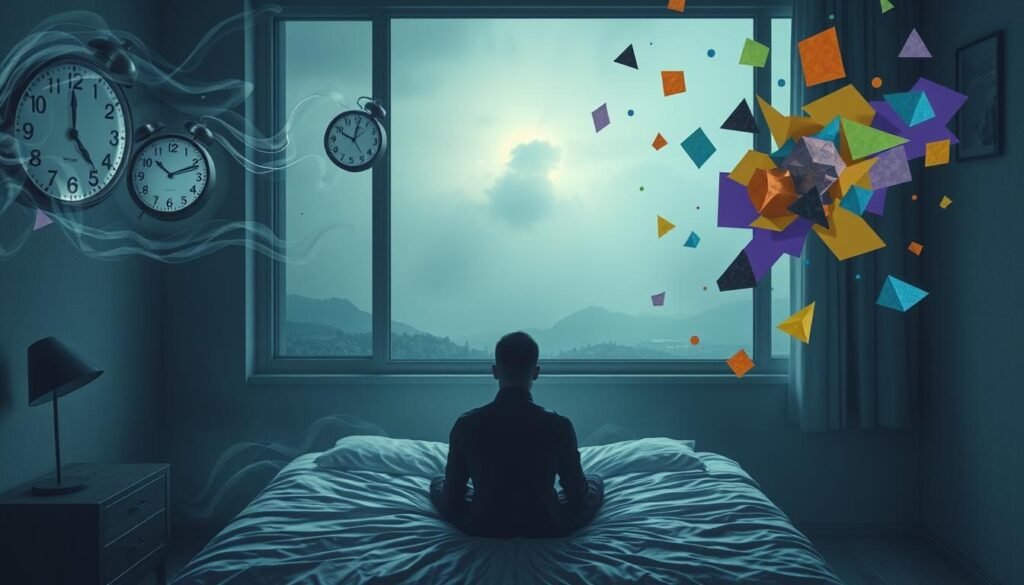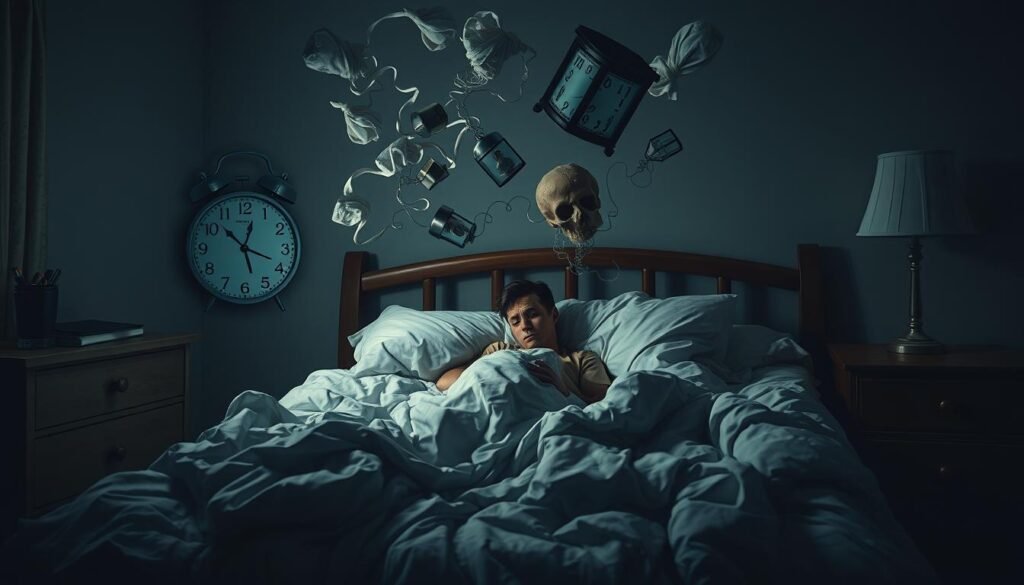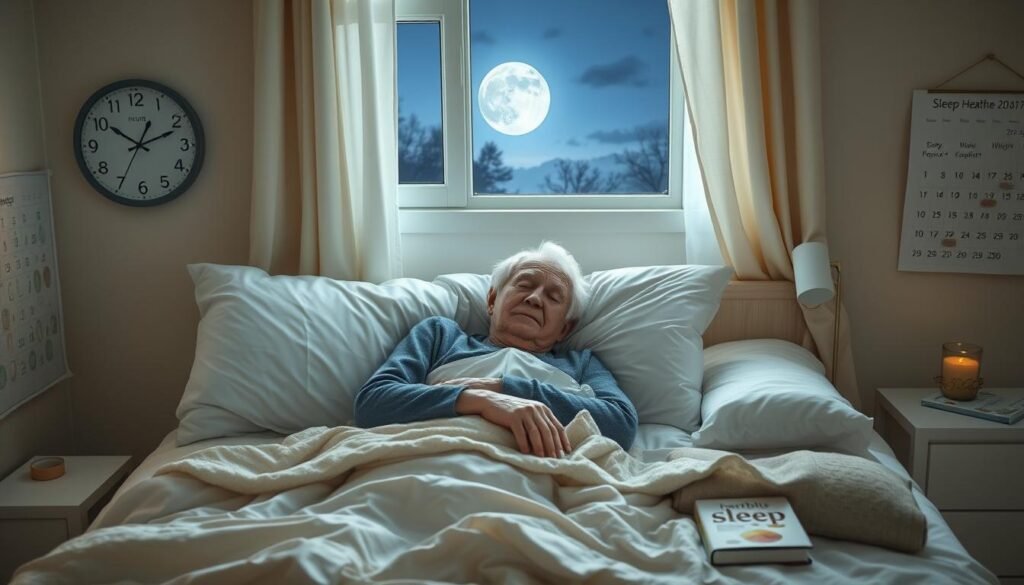About one in three adults face insomnia at some point. It’s a common sleep issue for both young and old people. You might find it hard to fall asleep, keep waking up, or wake up too early. Many things can cause insomnia, like stress, how you live, and where you sleep.
Insomnia does more than just ruin your night. It can make you feel tired all the time, upset your mood, and lower your life’s quality. Knowing what triggers your insomnia and spotting the signs early can help you sleep better.
Key Takeaways
- Insomnia affects women more frequently than men.
- Aging increases the likelihood of chronic insomnia.
- Acute insomnia lasts from a single night to a few weeks.
- Good sleep habits can combat insomnia effectively.
- Major risk factors include stress, lifestyle choices, and mental health issues.
- African Americans face higher risks and challenges related to sleep quality.
Understanding Insomnia
Insomnia means having trouble sleeping well. It leads to feeling tired and easily annoyed. Most adults need 7 to 9 hours of good sleep to feel their best. Some people have short-term insomnia from stress or big changes in life. Others have chronic insomnia, which lasts for three months or more. Knowing why you can’t sleep well is the first step to getting better.
Many things can cause the beginning of insomnia, like worry and medical issues. Studies show that up to 90 percent of anxious or depressed folks have sleep trouble. Anxiety makes it harder to fall asleep, making insomnia worse.
Things that can make it hard to sleep include big life changes, stress, bad sleep habits, drinking caffeine, eating big meals before bed, and using screens in your bedroom. Sleep problems like restless legs or sleep apnea can also make insomnia worse. It’s important to know these causes so you can find the right help.
To prevent insomnia, it helps to keep a regular sleep schedule, stay active, and have a calm bedtime routine. If you’re thinking about treatments for insomnia, like therapy or medicine, talk to a doctor first. They can help you understand the risks and benefits. For more on treating insomnia, check out insomnia treatment guidelines.
Common Symptoms of Insomnia
Many people suffering from insomnia deal with troubling symptoms. These can mess with their day-to-day life. Symptoms like trouble sleeping or waking up often during the night lead to being very tired and easily annoyed. It’s key to know these signs to spot insomnia and get help.
Difficulty Falling Asleep
Having a hard time getting to sleep is a main sign of insomnia. Folks lie in bed for hours, unable to get calm and sleep well. This trouble at the start messes up their whole sleep and makes them feel upset and worn out when awake.
Frequent Nighttime Wakefulness
Even after finally getting to sleep, some wake up a lot at night. These wake-ups stop them from getting the deep sleep needed. They end up feeling more tired and struggle to think clearly the next day. Such bad sleep patterns often repeat nightly for sufferers.
Waking Up Too Early
Waking up too early and not being able to fall back asleep is another common issue. This leaves people feeling not ready for the day and worried. Not sleeping enough makes the effects of insomnia worse, making it tough for many.
| Symptom | Description | Impact |
|---|---|---|
| Difficulty Falling Asleep | Prolonged wakefulness before sleep onset | Causes frustration and mental fatigue |
| Frequent Nighttime Wakefulness | Repeated awakenings throughout the night | Limits restorative sleep, leading to daytime sleepiness |
| Waking Up Too Early | Inability to resume sleep after early awakening | Results in feelings of unrest and anxiety |
It’s crucial to realize these symptoms to tackle the root problems and better overall health. Knowing about insomnia’s effects lets people work on getting better sleep.
What Causes Onset Insomnia
Insomnia’s start is often tied to clear factors, deeply affecting sleep quality. Recognizing these factors is key for better sleep management. Stress, lifestyle, and your surroundings contribute to sleepless nights.
Stress and Anxiety
For many, stress and anxiety are the main causes of insomnia. Life’s daily stresses—be it from work, relationships, or health—can overactivate the mind. This makes relaxing hard. Anxiety fills the mind with endless thoughts, delaying sleep.
This can lead to severe sleep loss if not tackled quickly.
Lifestyle Choices
Irregular sleeping patterns and staying up late affect sleep badly. Changing bedtime habits confuses our body’s clock. Eating badly before bed or too much screen time can make things worse.
This leads to trouble falling asleep and reduced sleep quality.
Environmental Factors
Your sleeping environment crucially affects how well you sleep. Loud noises, uncomfortable beds, or the wrong room temperature can prevent sleep. Making your bedroom peaceful and comfortable helps.
The Role of Sleep Deprivation
Sleep deprivation greatly affects our health. Studies show that over a third of U.S. adults slept too little in 2020. This causes problems with thinking and less alertness, making daily tasks hard.
Lack of sleep can make you feel anxious or depressed. In Florida, students who didn’t sleep enough felt sad and hopeless. Some even thought about suicide. This is a big issue for young people’s mental health.
About 35% of adults struggle with insomnia. It’s linked to mental health problems in nearly 40% of cases. Not sleeping enough can also lead to obesity, diabetes, and heart disease.
We must deal with sleep deprivation to combat insomnia and improve health. It’s important to get 7 to 9 hours of sleep every night for our well-being.

Short-Term Insomnia vs Chronic Insomnia
Insomnia comes in two main forms: short-term and chronic. Knowing the difference is key to managing and treating it well.
Defining Short-Term Insomnia
Short-term insomnia doesn’t last long, just a few days to weeks. It’s often due to stress or big changes in life. About 30 percent of people deal with it each year.
Those who have short-term insomnia struggle to sleep well. But, when the stress goes away, their sleep usually improves.
Understanding Chronic Insomnia
Chronic insomnia is more severe, happening three times a week for at least three months. It impacts about 10 percent of people, showing deeper health or mental issues might be present.
Those facing chronic insomnia often feel very tired and have trouble thinking clearly. Getting the right help is important for them.
| Type of Insomnia | Duration | Common Causes | Population Affected | Treatment Options |
|---|---|---|---|---|
| Short-Term Insomnia | Days to Weeks | Stress, Life Changes | Up to 30% | Over-the-Counter Sleep Aids, Relaxation Techniques |
| Chronic Insomnia | Three Months or More | Medical Conditions, Mental Health Issues | Around 10% | Cognitive Behavioral Therapy, Prescription Medications |
It’s important to know the difference between short-term and chronic insomnia. This helps in finding the right treatment. As many people suffer from insomnia, treating it right can help bring back a healthy lifestyle.
Sleep Disorders and Their Impact
Sleep disorders disrupt rest and lead to continuous fatigue. It’s key to understand these disorders for finding right treatments. Conditions worsening insomnia symptoms must be recognized early.
Identifying Common Sleep Disorders
Many sleep disorders affect our sleep patterns. Knowing them is important to ease insomnia and improve sleep. Here are some common ones:
- Sleep Apnea: This condition causes breathing to stop during sleep. It leads to multiple awakenings.
- Restless Legs Syndrome: It makes legs feel uncomfortable, causing a need to move them often.
- Narcolepsy: A disorder causing a lot of daytime sleepiness and sudden sleep attacks.
- Insomnia: Having trouble falling or staying asleep, which stress, choices, or health can trigger.
Knowing about these disorders helps us find better treatments. For example, untreated sleep apnea may lead to heart disease. But for general insomnia, better sleep habits help a lot.
| Sleep Disorder | Symptoms | Treatment Options |
|---|---|---|
| Sleep Apnea | Loud snoring, gasping for air, daytime sleepiness | Lifestyle changes, CPAP devices, surgery |
| Restless Legs Syndrome | Uncomfortable leg sensations, urge to move | Medication, lifestyle modifications |
| Narcolepsy | Daytime drowsiness, sudden sleep attacks | Medication, counseling |
| Insomnia | Difficulty falling/staying asleep | CBT-I, medication, lifestyle changes |

Tackling sleep disorders is vital to avoid serious health issues like heart disease and diabetes. Knowing these conditions enables individuals to improve their sleep and health.
Insomnia Triggers in Daily Life
It’s key to understand how daily life can cause insomnia. Many don’t see how jobs and what they eat affect sleep. By knowing these triggers, one can improve their sleep and overall health.
Occupation and Shift Work
Jobs with odd hours can make sleeping hard. This messes with the body’s natural clock, making a regular sleep pattern tough. It can also make one feel more stressed and change how they sleep. Those working in healthcare, law enforcement, and hospitality know this well. Creating a steady routine could help sleep better.
Dietary Choices and Late Meals
What you eat greatly affects your sleep. Eating heavy or spicy foods before bed can upset your stomach and disrupt rest. Caffeine and alcohol can also keep you from sleeping well. Eating better and on a schedule can improve sleep and lessen insomnia triggers.
The Connection Between Mental Health and Insomnia
There’s a deep link between our mental well-being and insomnia. It raises big concerns for public health. Around 50–80% of adults with mental health issues have trouble sleeping in any given year. Conditions like anxiety and depression can trigger insomnia. This starts a cycle of sleep problems that make things worse.
Over 90% of people with major depressive disorder struggle with sleep disturbances related to insomnia. This can lead to a worsening in mental health, sparking more anxiety and stress. For example, studies show that about 36% of people with insomnia end up feeling anxious. This disrupts both their emotional and mental state.
A study from Sweden in 2020 found individuals with obsessive-compulsive disorder (OCD) are nearly seven times more likely to be diagnosed with insomnia. About 80% of those with schizophrenia also report sleep problems. This shows that sleep issues affect many different mental health conditions.
The Diagnostic and Statistical Manual of Mental Disorders (DSM-5) lists insomnia as its own illness. To be officially insomnia, it needs to seriously affect someone, happening at least three nights a week for three months. Insomnia can lead to poor job performance, accidents, and worse life quality.
During and after COVID-19, insomnia symptoms have surged. A study discovered one in three adults faced clinical insomnia symptoms. That’s more than twice the rate before the pandemic. Improved mental health could help improve sleep for many people, as stress is linked to sleep problems.
Knowing the connection between mental health and insomnia is crucial. Approaches like Cognitive Behavioral Therapy for Insomnia (CBT-I) can help. Solutions that focus on both mental health and sleep hygiene could greatly help those suffering from insomnia and its impacts.
| Condition | Insomnia Prevalence |
|---|---|
| Anxiety | 36% |
| Major Depressive Disorder (MDD) | 90% |
| Obsessive-Compulsive Disorder (OCD) | 7x more likely |
| Schizophrenia | 80% |
Recognizing the Signs of Troubled Sleeping
It’s critical to spot the signs of troubled sleeping early. Around one-third of adults face insomnia at some point. They deal with mood swings, trouble focusing, and feeling tired during the day. Many turn to caffeine or stimulants to stay awake.
Here are signs that you might need help:
- Feeling consistently groggy or unrested upon waking
- Experiencing irritability or mood swings more than usual
- Having anxiety or worrying too much about sleep
- Reliance on sleep aids or drinking more alcohol at night
Keeping a sleep diary can reveal what’s hurting your sleep. Write down when you sleep, wake up, and how you feel. For reliable info on insomnia, visit this site.
Ignoring sleep problems can lead to health issues like heart disease or diabetes. Use mindful practices to face insomnia symptoms. This will guide you towards healthier sleep and a better life.
| Sign of Insomnia | Possible Consequences |
|---|---|
| Difficulty concentrating | Impaired performance at work or studies |
| Frequent mood swings | Strained relationships and increased irritability |
| Daytime tiredness | Higher risk of accidents, including while driving |
| Overuse of stimulants | Dependency on substances to stay awake |
How Aging Affects Sleep Patterns
As people get older, they often sleep less and wake up more at night. Studies reveal a slight decrease in sleep time, with older adults sleeping about 6.5 to 7 hours. They might wake up 3 to 4 times, affecting their deep sleep.
Insomnia is a major issue for many older people, hitting 10-30% of adults. Aging increases the chance of sleep disorders like restless legs syndrome and sleep apnea. Long-term insomnia can be dangerous. It can cause car accidents and make depression worse.

The body’s internal clock changes with age, messing with sleep patterns. After 60, you might lose about 27 minutes of sleep each decade. Less deep sleep and REM sleep lead to choppy sleep and make managing insomnia tougher.
Older folks face more health issues, which can disturb sleep. Certain meds, like ones for depression or blood pressure, might cause insomnia. Healthy habits, such as keeping a sleep schedule and cutting alcohol, can greatly improve sleep.
To really grasp how aging impacts sleep, diving into resources is key. One useful source talks about how periods affect sleep and the deep ties between hormones and sleep issues.
Understanding the link between sleep problems and aging helps caregivers and doctors come up with better solutions. This way, older adults can enjoy a higher quality of life, despite the challenges of getting older.
Conclusion
Insomnia impacts health and life quality deeply. Around 30% of adults globally report insomnia symptoms. Only 10% have severe enough issues to meet the full diagnosis criteria. This includes feeling tired during the day. Knowing how to handle insomnia is crucial because of its high prevalence.
Stress, lifestyle, and even where you live can trigger insomnia. It’s important to know what causes poor sleep. This helps in finding the right ways to get better rest.
Women and the elderly face higher risks of insomnia. Comorbid conditions like depression complicate things further. Studies show 40% of those with insomnia also have psychiatric disorders. It’s essential to see the link between sleep quality and mental health.
Various treatments can improve sleep. These include cognitive-behavioral therapy (CBT-I), changes in lifestyle, and sometimes medicine. Such strategies often lead to better sleep and well-being.
Achieving good sleep requires focus on sleep hygiene and professional advice when necessary. Dealing with insomnia’s triggers improves health. It encourages better functioning and improves overall health significantly.